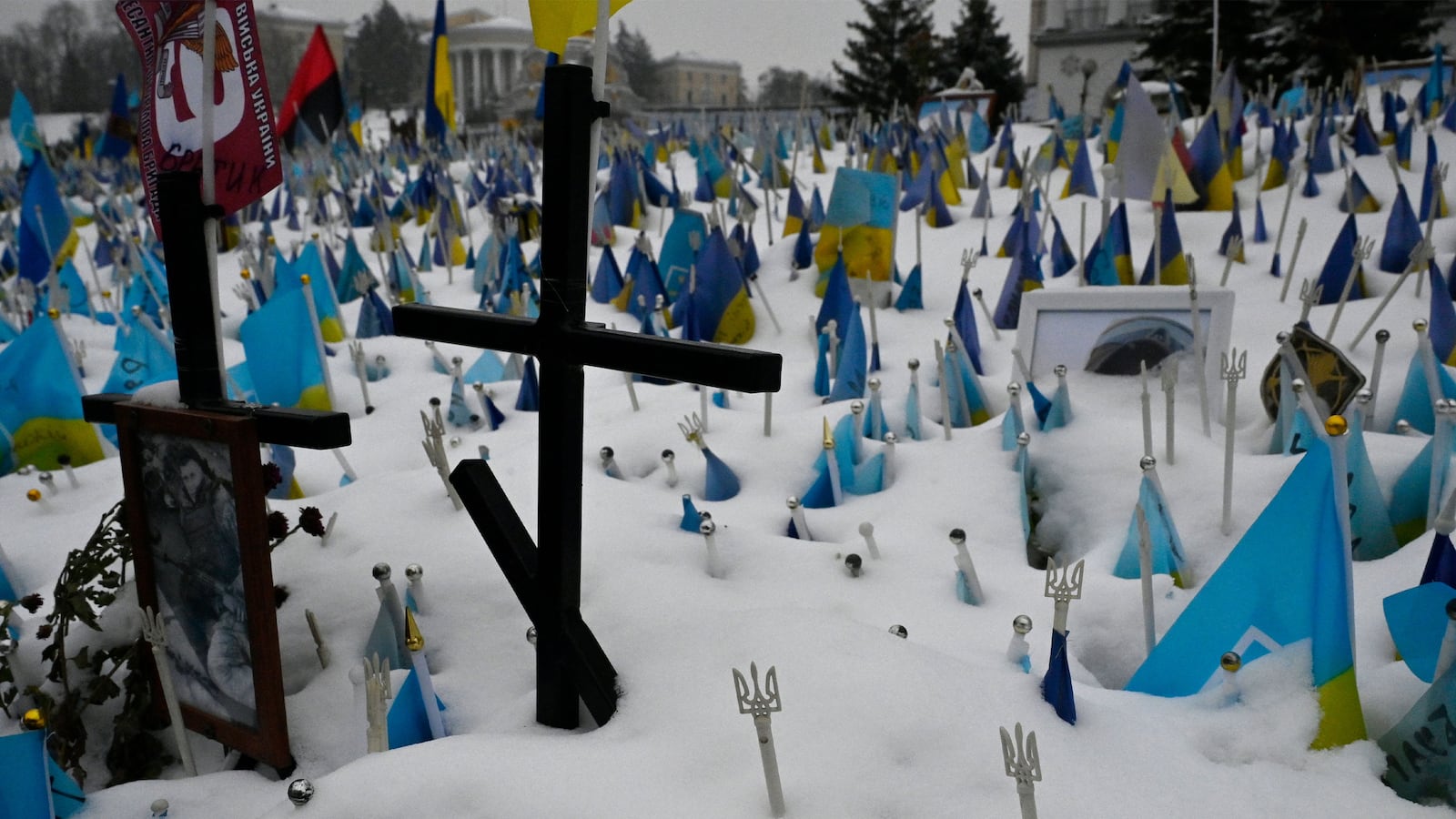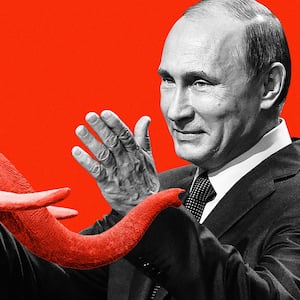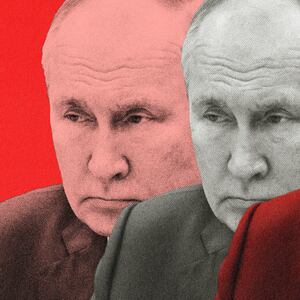PARIS—All bets on world peace slid off the table when Louis XV opened the École Militaire.
Nearly three centuries of belligerences later, and with more than $200 billion of Western cash gambled on Ukraine beating Russia, the military academy that once trained Napoleon last week assembled 100 military, political, finance, academic, and business leaders with intimate knowledge of the war to privately game out what happens next.
Before long, amid steely glances and chattering wine glasses, you’ll hear the anguished and morally obtuse story on the four lethal conflicts taking place in Ukraine: diplomatic, military, economic, and information.
The narratives are gagged by house rules that allow politically panicked government officials and their confidential kibitzers to speak freely but without being identified or quoted on whether the $75 billion America has so far staked on a Ukraine win is a lock or a sucker’s bet—and if Taylor Swift is now the only one with sufficient power to make Ukrainian victory a global priority.
Taylor Swift?
“My daughter suggested she could help,” one diplomat teased outside the no-quote zone, pondering whether the popstar could spin a few tunes and her 519 million Swifties to take on Vladimir Putin.

Rep. Steve Cohen (D-TN) arrives for a House Democrat caucus meeting with White House debt negotiators at the U.S. Capitol on May 31, 2023 in Washington, DC.
Anna Moneymaker/Getty ImagesAt first blush, the odds don’t look good.
The war is an exercise in costly rhetoric. It’s now exploded into an expensive crisis, triggering a global economic disaster and a dire need to immediately launch NATO airpower against Russian forces in Ukraine.
Yet it’s not too late for some of Ukraine’s more than 105,000 Baptists to visit America and sway evangelical Christians to convince MAGA Republican lawmakers into ponying up a significant amount of the minimum $750 billion it will cost to militarily defeat Russia and start rebuilding the country.
Baptists?
Tennessee congressman Steve Cohen told The Daily Beast that deploying Baptists is a sensible strategy. “The world is strange and crazy right now, and the Ukrainians certainly aren’t going to get Republicans on board without help,” says the Bible Belt Democrat and member of the House Judiciary Committee. “Evangelicals may be the only way left to educate more Americans.”
Indeed, two days before the delegates arrived in Paris, the U.S. Senate said no dice on backing a bill to give a further $64 billion to Ukraine. “There is no magical pot of funding available to meet this moment,” said Shalanda Young, director of the White House Office of Management and Budget.
“America is washing its hands of Ukraine,” a Ukrainian government counsellor grumbled on the sidelines of the Paris summit. “Their military expenditure priorities are aimed against China, while our country, all of Europe, is being stormed by Russian gangsters and social media propaganda. We are screwed, absolutely fucked.”
And conference-goers in private weren’t coquettish about what happens should voters next year send the criminally indicted, twice-impeached presumptive Republican presidential candidate Donald Trump back for an encore performance in the Oval Office.
“Trump’s specific guarantees to jail political opponents, create an American dictatorship—my God, abandon NATO—and execute insufficiently loyal generals has everyone on edge,” a military officer frets.
“Trump is intent on giving Ukraine to Russia in return for Putin again helping him become president,” Cohen says. “I see that percolating every day in Washington. The Speaker of the House [Mike Johnson] and his MAGA Republicans have absolutely no sense of what’s going on in the world.”
The war to win Ukraine is fought on multiple fronts and among the countless ways analysts deconstructed the conflict perhaps the most peculiar was the legal combat over who owns the delightful slogan “Russian Warship, Go Fuck Yourself.”
The Administration of the State Ukrainian Border Guard Service of Ukraine in 2022 filed an application with the European Union Intellectual Property Office to trademark the Snake Island battle cry. “Many people are using the phrase commercially without the soldier and his family’s consent,” read the request.

Russian soldiers are seen on a tank in Volnovakha district in the pro-Russian separatists-controlled Donetsk, in Ukraine on March 26, 2022. Volnovaha, one of the 18 regions of Donetsk in eastern Ukraine, has been under the control of the Russian Armed Forces and the pro-Russian separatist in Donetsk since March 11.
Sefa Karacan/Anadolu Agency via Getty ImagesEUIPO’s recent rejection of the government’s application to cash in a few war chips only energized the sale of war-branded Ukrainian consumer goods such as Chornobaivka melons, Azovstal radishes and Armed Forces Sausages, washed down with local favorite Bucha Kombucha.
“Who in their right mind on February 24, 2022, imagined selling Heroes Don’t Die Beer to stop Russian aggression,” a delegate sighed during recess in the military school’s courtyard. “The Ukrainians are forced to raise money and awareness this way because the Russians have invested hundreds of millions more than them on the propaganda war.”
At the same time, many of Ukraine’s friends and allies continue to gruesomely underwrite the cost of Russian misinformation and brutality. There’s apparently no way for countries such as Germany and India to detox their voters from discounted energy. Sales of Russian gas over the first nine months of 2023 amounted to $50 billion. And Ukrainian officials are furious over the West’s refusal to give them the 300 billion euros of Russian central bank assets they’ve seized over the past two years.
Sanctions against Russia are weak by design is the conventional wisdom underscored with refrains such as Russia has made Ukraine a global war and Fail to defeat Russia and watch NATO defense budgets go up dramatically.
Meanwhile, back on the front line, what happens in Volnovakha stays in Volnovakha. Severe rules placed on foreign and domestic journalists have created a Vegas-style information vacuum. Authorities are muzzling access, snubbing questions, and threatening to pull the authorization of any correspondent who files a report contrary to the government’s guidelines. “There are many stories we’re aware of but our credentials are at risk if we write them,” a veteran reporter in Kyiv explains.
Transparency is awkward 654 days into a war euphemistically described as a stalemate stinking of the air inside a coffin. A mourning descends on the French war college: Ukraine is on the cusp of losing, and NATO’s fear of an all-out conflict with Russia has left Western democracies on the wrong side of history.
For those inimitably familiar with Ukraine’s plight, America and its allies also flush with cash are gambling like skinflints: deep pockets, short arms and no guts. Their drip-drip-drip of military largesse allows Ukraine to stay alive, but does not allow Ukraine to win the game.
Although Volodymyr Zelensky is scheduled Tuesday for his third powwow with President Joe Biden since the war began, Cohen says U.S. cavalry isn’t riding to the rescue.
“Congress won’t come together to help Ukraine anytime soon,” he says.
The fear and loathing of abandonment is palpable.
Rag-tag infantry heroes are firing World War I machine guns at Russian drones. The top Ukrainian military commander says that training and recruiting troops has become a dismal challenge. “The prolonged nature of the war,” Valery Zaluzhny said in a recent essay, “significantly reduce the motivation of citizens to serve with the military.”
The U.S. Centers for Disease Control and Prevention reports Ukrainian physicians are battling an “alarming increase” in germs resistant to antibiotics, and the infections are cascading beyond its borders. The U.N. World Food Program euphemistically describes 11 million Ukrainians as “food insecure,” facing another bitterly cold winter without power and “one step closer to a hunger catastrophe.” Landmines and other deadly debris have left vast tracts of farmland too dangerous to plant.
Ukraine in two years won’t have enough warm bodies to fill the trenches and freeze the lines against the Russian onslaught, which has already accounted for some 57,000 registered war crimes, alongside an estimated 70,000 Ukrainian soldiers killed, 120,000 wounded, and more than 10,000 dead civilians.
But every number in this war is sclerotic, clouded in secrecy, and garbled by politicians fearful of providing an accurate accounting. The proverbial bottom line: Ukraine neither possesses the guns, ammo, money, medicine, food nor combatants to defeat the potential 3.3 million troops Russia could put on the battlefield—or the resources required to overpower the Kremlin’s ubiquitous social media trolls in the likewise deadly struggle for hearts and minds.
“The information war over the internet shapes the public opinion that guides the elite political and decision making on financial aid to Ukraine,” says Anastasiya Shapochkina, director of Eastern Circles, a policy research group on energy and defense in Eastern Europe. “It must be won at all costs.”
Cohen agrees, telling The Daily Beast there’s nothing whimsical about Swifties sending an SOS TikTok to TIME’s 2023 Person of the Year. After all, Swift did smack down finalist Vladimir Putin to win the magazine’s annual honorific.
“Taylor Swift has the power to educate the public on what’s happening in Ukraine,” says Cohen. The rock’n’roll guitar-playing lawmaker from Memphis should know, too. He’s a member of the House Commission on Security and Cooperation in Europe and has spent 16 years representing Elvis’ district on Capitol Hill.
“If you’re skeptical,” TIME recommends, “consider it: How many conversations did you have about Taylor Swift this year? How many times did you see a photo of her while scrolling on your phone?”
According to the collective wisdoms mustered inside the École Militaire, if the West keeps singing the same tune in Ukraine, what Cohen describes as a replay of the Great War of 1914-18 is on track to leave democracy “screaming from a crypt.”







